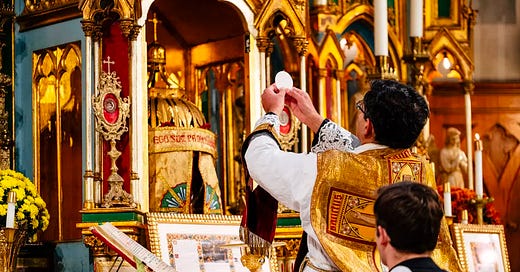What should people do when they go to Mass? This was the topic of a recent article in a notable Catholic publication. In particular, the article mentioned this quote by the great English priest, Monsignor Ronald Knox:
“if you find it difficult or if you find it dull trying to follow the Mass, you are much better employed in simply kneeling there and saying your prayers, with a book or without a book, while Mass is going on” and that “[t]he Church doesn't oblige you to follow Mass; she only obliges you…to be there.”
To be sure, if someone is genuinely incapable of following along at Mass, there is nothing wrong for that person to engage in some form of personal prayer. However, this is not the ideal situation. For this, it would be helpful to turn to the words of Fr. Stedman, an American priest who did much to help popularize the use of hand Missals for people going to Mass.
In the introduction to the 1937 edition of his “My Sunday Missal,” Fr. Stedman addresses the question of engaging in personal devotions during Mass:
“The Mass, according to the saintly Piux X, is the “primary and indispensable source of the true Christian spirit and the faithful will be filled with this spirit only in proportion as they participate in the sacred mysteries.” Notice the words “primary” and “indispensable.”
All other exercises, private and public are secondary. The rosary, Benediction, novena services, the way of the cross, all other private and public devotions are beneficial, but all their efficacy is drawn from the sacrifice of the cross, offered again in every Mass.
In this age of universal reading and inexpensive printing only the Missal should be used at Mass. All honor to devotions and other devotional prayers, but let them recited at their proper time, not during Mass.”
But what of the quote from Monsignor Knox that “[t]he Church doesn't oblige you to follow Mass; she only obliges you…to be there?” Again, it is informative to note this quote from Fr. Stedman's “My Sunday Missal”:
“Too long have people forgotten that they are not merely to assist at Mass but to actually participate in it; not merely to hear Mass but to take a personal part in it; that the missal is not the private prayer of the priest at the altar, but the collective prayer of all present both in the pews as well as at the altar.”
This is reiterated by the Second Vatican Council, which taught:
“Mother Church earnestly desires that all the faithful should be led to that fully conscious, and active participation in liturgical celebrations which is demanded by the very nature of the liturgy. Such participation by the Christian people as "a chosen race, a royal priesthood, a holy nation, a redeemed people (1 Pet. 2:9; cf. 2:4-5), is their right and duty by reason of their baptism.”
The topic of active participation has also been the subject of numerous statements from 20th and 21st century Popes, which will be discussed in a future post.





Pope St. Pius X taught that the time had come for the laity to once again sing the Ordinary of the Mass antiphonally with the choir. This is done most beautifully in Europe, especially France. Thank you for this article!